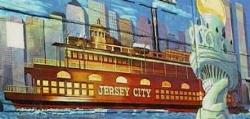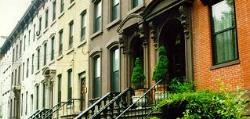 |  |  |
|
| ||
 |  |  |
 |  |  |
|
| ||
 |  |  |

 |
 |

Originally published in 1939
Some of this information may no longer be current and in that case is presented for historical interest only.
Edited by GET NJ, COPYRIGHT 2002
| 1850 | Population 489,555. |
| 1851 | Clara Barton establishes free school at Bordentown. |
| 1854 | First wrought-iron beams for building rolled at Peter Cooper's Iron Works, Trenton. |
| 1855 | First New Jersey normal school (Trenton State Teachers College) established. |
| 1858 | First transatlantic cable message (sent to President Buchanan by
Queen Victoria) forwarded from Newfoundland, received by John
H. Wright at Trenton. Steel-pen factory established at Camden by Richard Esterbrook. |
| 1860 | Population 672,035. |
| 1861 | April 30. State Legislature appropriates $2,000,000 for Civil War
purposes. May 3. Four regiments of New Jersey volunteers leave for Annapolis. Maj. Gen. Philip Kearny, commanding New Jersey volunteers, slain in Battle of Chantilly. |
| 1865 | April. Civil War ends. New Jersey's contribution, according to
Federal statistics, was 76,814 men, including re-enlistments; re-duced to 3 years' standing, 57,908. (State records show up to
88,306 men.) September. Rutgers Scientific School, at New Brunswick, opens. |
| 1866 | Legislature creates a State Board of Education. |
| 1869 | Celluloid patented by John Wesley Hyatt of Newark. Rutgers defeats Princeton in first intercollegiate football game. |
| 1870 | Population 906,096. First boardwalk completed in Atlantic City. |
| 1871 | Free public school system established throughout State. Pennsylvania R.R. enters New Jersey with lease of Camden and Amboy lines. Stevens Institute of Technology founded at Hoboken. |
| 1872 | Dr. Charles Abbott discovers important artifacts in Trenton gravels. |
| 1873 | Pennsylvania R.R. monopoly between New York and Philadelphia ends with law opening State to all railroads. |
| 1874 | Act making school attendance compulsory passed. |
| 1875 | Twenty-eight amendments to State Constitution ratified by the people. |
| 1876 | Standard Oil Co. establishes refinery at Bayonne. |
| 1877 | Socialist Labor Party of North America holds first national convention at Newark. State Board of Health created. Prudential Insurance Co. founded at Newark. |
| 1878 | Board of Labor Statistics is created. |
| 1879 | World's first practical incandescent lamp lit by Thomas Edison at Menlo Park. |
| 1880 | Population 1,131,116. American Society of Mechanical Engineers founded at Hoboken. |
| 1881 | First successful submarine in world launched in Passaic River by John Holland. |
| 1883 | Agricultural Experiment Station established at New Brunswick. Newark Evening News founded. |
| 1884 | Election of Grover Cleveland, only President born in New Jersey. |
| 1885 | Gen. George B. McClellan dies at Orange. |
| 1887 | Flexible photo-film invented by the Rev. Hannibal Goodwin,
Newark. State Board of Agriculture created. |
| 1890 | Population 1,444,933. |
|
| Clark Thread Mills operatives strike (December-April, 3,000 workers). |
| 1891 | July 25. World's first smokeless powder, developed at Hudson Maxim's plant at Maxim, is first used in America at Sandy Hook in an 8-inch rifled gun. |
| 1892 | March 26. Walt Whitman dies at Camden. |
| 1895 | First woman (Miss Mary Philbrook) admitted to New Jersey Bar. Highest temperature (109°) recorded at Somerville. |
| 1896 | Corporation laws revised to facilitate formation of trusts. |
| 1897 | State Constitution again amended. |
| 1898 | Three regiments of infantry mustered in at Sea Girt for Spanish-American War. |
|
Return To |
|

|